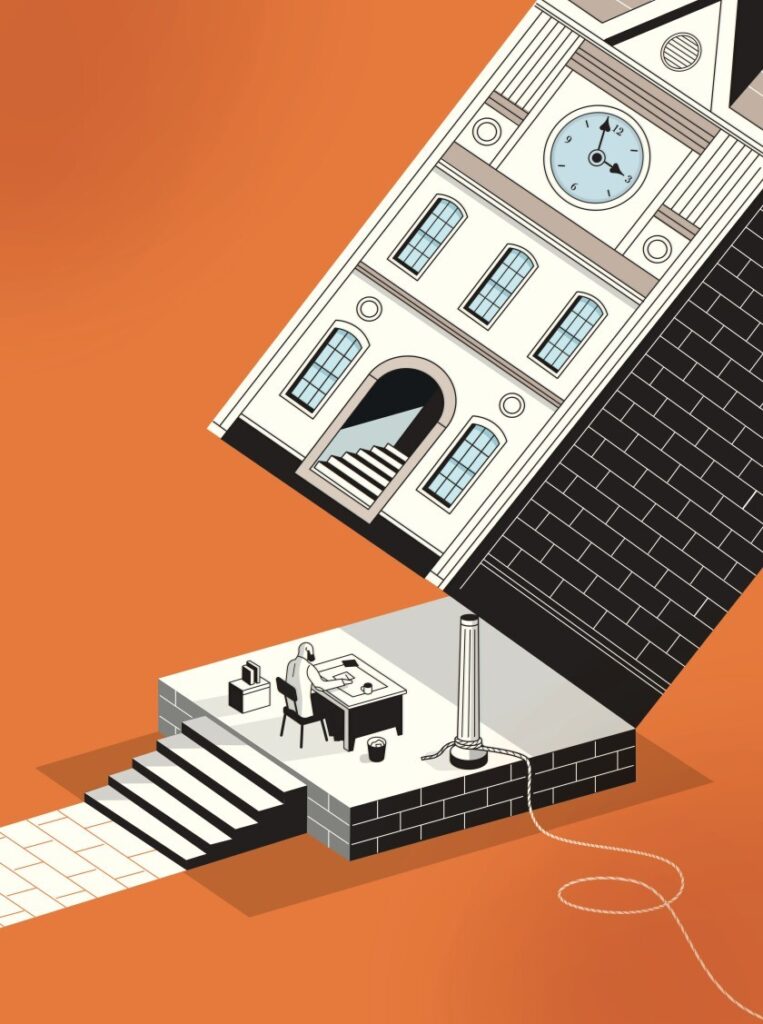
Continued …
As productivity becomes increasingly commodified, the long stretch of time needed to think and write evaporates.
Depending on the restaurant, one might take some pride in the quality of the food served, or in the elegant gestures required to deliver dishes to multiple tables at once, clear places for the lunch or dinner rush, and smooth the pace of labor. But there is also always the hidden psychic and physical strain of maintaining this system, avoiding catastrophes, and keeping one’s dignity in the face of lecherous members of the kitchen staff and creepy customers.
“I think I know what sort of person I am,” Davis’s narrator comments, before clarifying, “I know I am not the sort of person I imagine when I hear that a person has a position at the university.” The “problem,” as the narrator sees it, is that “when others describe me this way, they appear to describe me completely,” but this presumption fails to register “truths that seem quite incompatible with the fact that I have a position at the university.”
Davis’s narrator is describing the condition of Erving Goffman’s “total institution,” where one’s sensibility is shaped by the routines and behaviors of the place and its system. The university is at once a physical workplace and an institution, like a monastery, that assumes those who enter into its halls will submit willingly to its precepts and endure the long apprenticeship required of them.
Intellectual labor is not the same as slinging hash, of course, and the university is a privileged site within late capitalist democracies, but there is also the daily slog of researching, writing, speaking, revising, submitting, more revising, editing, and proofreading, not to mention teaching and advising. We sometimes resent the unglamorous work beyond the glorious thinking that goes into making something happen with words, but it must be done, by someone, by ourselves, in the case of the person with the “position at the university.”
Davis’s meditation on surface and depth, self and university, is an update of Franz Kafka’s 1917 short story “A Report to an Academy,” in which the narrator, once an ape, has become a bourgeois scholar over the course of five years. The narrator explains that he has transformed “at full speed … more or less accompanied by excellent mentors, good advice, applause, and orchestral music, yet essentially alone.” This period of five years — almost matching the length of most graduate programs, tenure clocks, and the ideal interval between promotion to associate professor and promotion to full professor — offers enough distance from one’s past identity to the present. The line conveys not only the energy but also the pathos accompanying the transformation from ape to academic, or from neophyte to senior scholar. This transformation entails dogged effort as well as forgetting and alienation.
Kafka’s story allegorizes the process of acculturation and indoctrination that the academy demands of its members. Once you decide to leave your past (as an ape) and enter the halls of the human(ities), the doorway narrows, sending you irresistibly ahead. The ape becomes adept at the “artistic” performance of drinking and utters a first “Hallo!” The learned behavior brings “a success that could hardly be increased,” but this success is trailed by the “insane look of the bewildered half-broken animal” clouding the eyes of a “half-trained little chimpanzee,” a mate who waits at home. This achievement, pretensions to a bourgeois life, comes at a cost that cannot be completely registered or forgotten.
Both Kafka and Davis understand the intricacies of survival and abasement entailed in claiming a professional identity, of subsuming yourself into an institution. One submits, both willingly and unwillingly, to the university. Definite and indefinite articles slide through these tales, almost interchangeably, so that it becomes difficult to differentiate between a self and the institution. And that is the point.
By the time one moves from assistant professor to associate professor and then to full professor, there is no going back. If all goes as planned, one holds a position at the university for life. So why the reluctance or resistance or whatever it is that holds one back, if that is what is happening?
More than a decade ago, when I was on the MLA Committee on the Status of Women in the Profession, we initiated the Associate Professor Project to investigate whether women were disproportionately getting stuck at the associate-professor level. It turned out, however, that almost everyone — no matter the gender — was stalling midcareer. One thing we learned back then was that funding often began to dry up and did not get restored until one became quite senior, and perhaps earned an endowed professorship. Another was that service was thrust upon people almost immediately after promotion to associate, and with little training.
Shortly after the report was published, I became chair of my department, and as a result of the committee’s findings, I pushed a number of associate professors into promotion — 75 percent were women, 50 percent were people of color, and all were long overdue to become full professors. Why they had not already been promoted was complicated and telling: For one, they felt that there was little financial incentive. Because of this, I pushed the dean to drastically increase the pay bump for promotion. These professors also felt, as I had, that at this stage in their lives they did not want to submit to a process that appeared to be degrading at worst, time-consuming at best. They were just too jaded. Nobody had suggested to them that they might seek promotion. It seemed there was little to be gained. None was a careerist; all were vastly accomplished. Helping these individuals become full professors was among the best things I achieved as chair.
In preparation for this essay, I interviewed a terribly unscientific group of associate professors about what they might want to see done for them if they were to move into more senior roles. Men and women, single and partnered, parents and not, gay and straight, people of color and not, ranging in age from their 30s to their 60s. They came from institutions across the country. Some worked in the humanities, others in the social sciences or STEM. Some worked at large, prestigious research universities, both private and public, while others held positions at small liberal-arts colleges of all types.
Each person in this diverse bunch echoed the thoughts of those I had helped shepherd into full professorships. They wondered: Was there a point to enduring the process? Blame must fall in part at the feet of overstretched department chairs who (understandably) give priority to other pressing tasks, like tenure and hiring, budgets, staffing, curriculum, and so on. But of course, these departmental chores — ever expanding as bureaucracy bulges — derive from the same endless administrative bloat (another strategic plan!) fueled by deans and provosts and vice presidents that has resulted in the enormous increase in contingent faculty. This is the state of the academy today.
One newly minted associate professor at an elite private university (I promised anonymity to all who graciously spoke with me) commented on the pressures connected with promotion to associate professor — the endless time commitments, the countless urgent e-mails demanding immediate responses that come with being thrust unprepared into administrative and advising positions.
That professor also spoke about the anxieties of being responsible for someone else’s career. Up to this point, as a graduate student, a postdoc, and an assistant professor, one needed to focus only on one’s own work. Now, as a mentor to assistant professors, graduate students, postdocs, and undergraduates, and as an administrator trying to juggle advocating for these individuals and dealing with administrators beyond the department, proceeding further seemed unfathomable. Doing so would only mean getting bogged down in even more administration. The payoff, for this professor, did not seem worth it. The person was content to bide their time accumulating books and papers.
Another recently promoted associate professor, this one at a small liberal-arts college, had an epiphany while rereading Das Kapital for a course on Marxist cultural criticism. The concepts of absolute and relative surplus value, especially as these values are created through the “productiveness” and “intensity” of labor, changed how this professor viewed their workload. They grew disenchanted with the expectation that after all the teaching and advising accomplished during the academic year, one’s unpaid summertime would be made productive by writing articles. In this light, researching, writing, and creating ideas were just more forms of alienated labor. Getting promoted meant aligning one’s labor with that of the institution. People become professors in part because they vehemently refuse to sit still in an office and churn out memos. But that is what is demanded of those of us who, as good academic citizens, find ourselves supporting our institutions. We toil over faculty activity reports, or FAR(T)s, as I used to call our yearly ritualized debasement of merit review. In exchange for polishing our scholarly bona fides/turds, we get pittance raises, often less than cost-of-living adjustments. This is the form of self-promotion one must master.
Continue reading …

